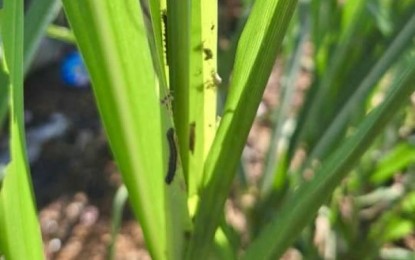Gov’t, private sector fight armyworm infestation in Negros Occidental

BACOLOD CITY – Government and private sectors are addressing armyworm infestations in corn and sugarcane fields across four LGUs in Negros Occidental’s fifth district. Areas affected include Isabela, Binalbagan, Moises Padilla, and Himamaylan City. Rep. Emilio Bernardino Yulo reported the damage to the DA and OPA. Alongside SRA personnel, Yulo demonstrated chemical control methods in Himamaylan City. OPA is assessing the infestation to prevent further spread and recurrence.
BACOLOD CITY – Both the government and the private sector have taken measures to address the infestation of armyworm in corn and sugarcane fields in at least four local government units (LGUs) in the fifth district of Negros Occidental.
Affected areas include some villages in Isabela, Binalbagan and Moises Padilla as well as Himamaylan City.
Negros Occidental 5th District Rep. Emilio Bernardino Yulo, who monitors the extent of the damage, said he has reported the infestation to the Department of Agriculture (DA) and the Office of the Provincial Agriculturist (OPA).
On Thursday, together with personnel from the Sugar Regulatory Administration (SRA), Yulo observed a demonstration on chemical control of the infestation in Sitio Iling-iling, Barangay Cabadiangan, Himamaylan City.
“Majority of those affected are sugarcane, although there are also cornfields that were affected. We want to prevent the infestation from further spreading and also from recurring,” Yulo said in an interview.
An infestation was reported in cornfields at Barangay Santol, Binalbagan and in Barangay Quintin Remo, Moises Padilla, he added.
OPA head Dina Genzola said their personnel are conducting an assessment and validation of the armyworm infestation in coordination with the affected local government units.
According to the DA, armyworms are destructive pest named after their army-like movement in agricultural fields and would usually consume turf grass, but would eat any vegetation in their path.
They can be controlled using neem oil-based sprays or with biological controls like earwigs, spiders, and predatory wasps.
Prolonged drought followed by heavy rains are seen to sustain the development of armyworms, various studies showed.(PNA)
Source Link: https://www.pna.gov.ph/articles/1227357














